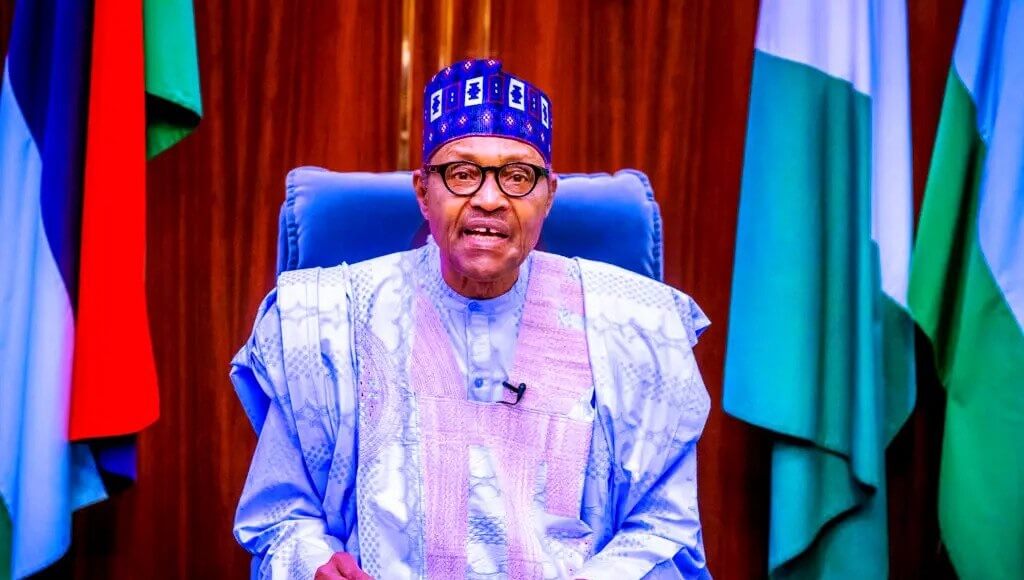President Muhammadu Buhari has decried the state of the Nigerian economy which he said is being confronted with high inflation, unemployment and debt crisis.
The President who in 2015 and 2019 pledged better standard of living and lifting 100 million out of poverty also decried the deteriorating standard of living of Nigerians.
Advertisement
Buhari during a national broadcast on Nigeria’s 62nd Independence Day on Saturday, however, noted that gains have been made under his watch.
He said, “I then pledged to Improve the economy, tackle corruption and fight insecurity and this was further strengthened by my commitment to lift 100 million Nigerians out of poverty in ten years as the central plank of my second term in 2019.
“We are confronting current economic challenges such as debt burden, growing inflation, living standards and increasing unemployment accentuated by our growing youthful population. These problems are globally induced and we would continue to ensure that their negative effects are addressed in our policies.”
Under Buhari, Nigeria’s unemployment rate hit 33.33 per cent in 2020, inflation has skyrocketed to 20.52 per cent in August and the naira has crashed from around N172 per dollars in 2014 to N432.8 and N731 per dollar in 2022 at the CBN and black market respectively.
Advertisement
Buhari said Nigerian witnessed twin economic recession in 2016 and 2020 which pushed more people into poverty.
The world Bank said the country’s rising inflation had pushed 7 million into poverty in 2020 where Covid-19 struck.
But Buhari said, “Our efforts in re-setting the economy manifested in Nigeria exiting two economic recessions by the very practical and realistic monetary and fiscal measures to ensure effective public financial management.
“In addition, the effective implementation of the Treasury Single Account and cutting down on the cost of governance also facilitated early exits from recessions.
“This administration will continue to ensure that our fiscal policies are supported by a robust and contemporary monetary policy that recognises our peculiarities in the midst of the growing global economic difficulties.
Advertisement
“his is evidenced by the recent Monetary Policy Committee decision to maintain all parameters, especially interest rates and marginally increased the Monetary Policy Rate (MPR) from 14% to 15.5% and the Cash Reserve Ratio (CRR) from 27.5% to 32.5%. It is projected that this would further insulate our economy from over exposure to uncertainties at the international market by restraining growth in core inflation.”
Speaking on his achievements, Buhari said the signing of the Petroleum Industry Act, a legislation which overhauls the oil and gas industry has removed the barriers that scared foreign investors into the sector.
According to him, his administration has made a landmark achievement in infrastructural development like the rail way as well as prioritizing the Agric Sector.
Buhari said, “This administration removed several decades uncertainty for potential Investors in the Oil & Gas sector with the passage of the Petroleum Industry Act, 2021. This landmark legislation created opportunities for foreign investments in addition to improving transparency in the management of the sector.
“Our administration has given the desired priority to the Agricultural Sector through a series of incentives to Micro, Small and Medium Scale Enterprises that resulted in creating millions of jobs. Leading this initiative, the Central Bank of Nigeria’s intervention in a number of areas as well as the Anchor Borrowers Programme had created the required leverages for Nigerians towards self-sufficiency in food and the necessary attraction for farming as a business.
“The growing contribution of non-oil exports, especially in agriculture, information and communication technology as well as the performing arts to our national economy will enhance our foreign exchange earning capacity.”
Advertisement
He also reiterated commitment to drive infrastructural growth during his last five months in office.
He added, “We will continue to ensure that our infrastructure drive remains the key to Nigeria’s economic growth and for which every Nigerian will feel the impact.
“The Federal Government is already expanding ports operations to ensure that they provide opportunities for the growth of the Nigerian economy.
“We have also continued to accelerate our infrastructure development through serviceable and transparent borrowing, improved capital inflow & increased revenue generation by expanding the tax bases and prudent management of investment proceeds in the Sovereign Wealth Fund.
“To further open up our communities to economic activities, we have continued to boost our railway infrastructure with the completion of a good number of critical railways and at the same time rehabilitating as well as upgrading obsolete equipment.”



